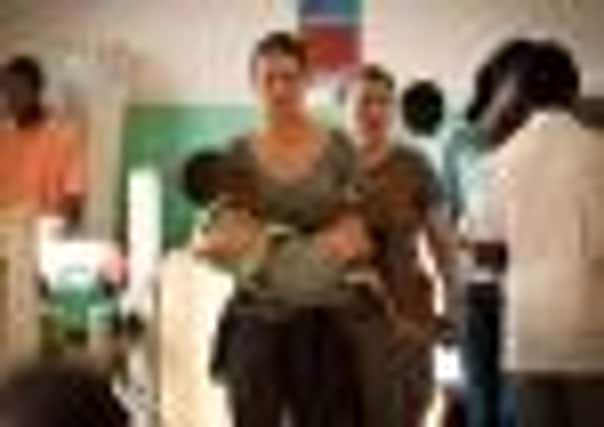TV preview: Mary and Martha | Heading Out


Mary And Martha, Friday, BBC1, 8:30pm
Heading Out, Tuesday, BBC2, 10pm
So awful at others: Julia Roberts’ “I’m just a girl” speech in Notting Hill, the bit in Love Actually with the little boy chasing the little girl through the airport to announce his love, or nearly all the other bits in Love Actually, or the big dollop of slushy, unashamed, love-conquers-all, Wet Wet Wet-soundtracked sentimentality with which he was singlehandedly responsible for infecting a generation of British filmmakers. He’s one of the most popular and populist writers and directors working today, but for anyone with even a slight touch of cynicism (and surely, that’s practically a national trait?), he’s incredibly problematic.
Mary And Martha, a glossy drama to tie in with Comic Relief, is, in some ways, typical Richard Curtis. It’s emotionally manipulative – many will cry – and simplistic and has music which tells you exactly what to feel about things and a message which, broken down, is gobsmackingly obvious: people are all the same. And yet, damn him, we must overlook all that, because it is for A Good Cause. An irreproachably Good Cause: raising awareness of the obscene blight of malaria which kills more than 660,000 a year, mostly African children. And it’s all preventable, if we cared enough, and so Richard Curtis is going to try to make us care by every trick in his book.
Advertisement
Hide AdFrom the opening scene, as American super-mom Mary and British mum Martha joke with their lovely, beloved boys, you know what’s coming. The story takes its time, making you feel just how much they love them, as Mary and her child visit Africa to widen his privileged horizons (by staying in a luxury lodge) and Martha’s grown-up son becomes a volunteer teacher at an orphanage nearby. When the inevitable happens, it makes you feel their mutual grief, at length. And then it asks you: isn’t this how every mother who loses a child to malaria feels? And why is that not an international outrage?
Curtis isn’t interested in looking at the geo-political background or the economic structures that underpin this crime (for it surely is). He doesn’t have any qualms about telling a largely African story through the perspective of two white western women, because we can’t be trusted to care enough otherwise. He just wants you to feel how awful it is and to donate some money to the cause. And while there are aspects which make me feel really uncomfortable, many will do that and it’ll make a difference, so who cares what I think.
As for the drama itself, though it’s hard to view outside its message, it is beautifully filmed (by veteran director Phillip Noyce), with a fun soundtrack, stunning locations (both Africa and Mary’s covetable home) and committed performances. The fact that Hilary Swank has two Oscars (while Alfred Hitchcock, Marilyn Monroe, Cary Grant and Sigourney Weaver never won one between them) has long been one of those puzzling Hollywood mysteries. But she’s terrific here: wrenching genuine sincerity on top of what is already obviously a heartrending story. As Martha, Brenda Blethyn has less to do, but is also affecting and real, particularly when admitting to her husband that she’s been left so devastated because “I put all my eggs in one basket”. James Woods also turns up to help them campaign for the obligatory happy-ish ending.
Parent and child relations are a theme of Heading Out, Sue Perkins’ new sitcom, too – but in a much less moving way. Perkins has become ubiquitous at the BBC in the last few years, whether eating peculiar period food or learning to conduct orchestras or telling us about Mrs Dickens/Maria Von Trapp or, as co-host of The Great British Bake-Off, making bad puns about buns. Someone, somewhere, has decided we can’t get enough of her. You may have your own feelings about this. Well, here she is again, allegedly going back to her comedy roots with her own sitcom, where she plays Sara, a neurotic vet who’s about to turn 40 but hasn’t yet managed to tell her parents that she’s gay. Despite being kind of annoying, she has supportive friends (including ever-reliable performers Nicola Walker and Joanna Scanlan) and is able to attract hot ladies like Shelley Conn, who is charmed by Sara’s rotten patter and way with extracting barbed wire from dogs’ paws.
Around 50 per cent of the show is laboured animal slapstick – there is a dead cat which is lugged around to decreasing effect – and the other half is meant to be touching, as Sara wrestles with her inadequacies and her friends urge her to finally come out to her folks. It’s an awkward mix. The comedy just isn’t that funny and the sentiment isn’t that interesting. At times I felt a bit of second-hand embarrassment and – worst of all – the show reminded me of two grim indulgent sitcoms of years past: Baddiel’s Syndrome, in which David Baddiel and his mates failed miserably at doing a Seinfeld, and Rhona, in which Rhona Cameron and her mates (including Perkins’ double act and Bake-Off partner Mel Giedroyc) failed at doing an Ellen. What they all have in common is that their stars aren’t actually actors but stand-ups, and that the other two only lasted one series. There’s a lesson there.